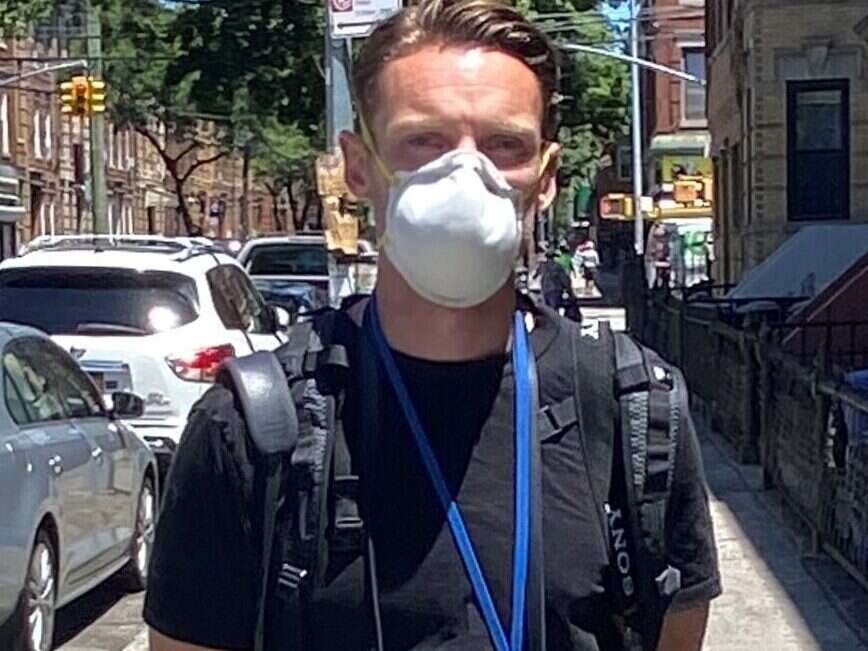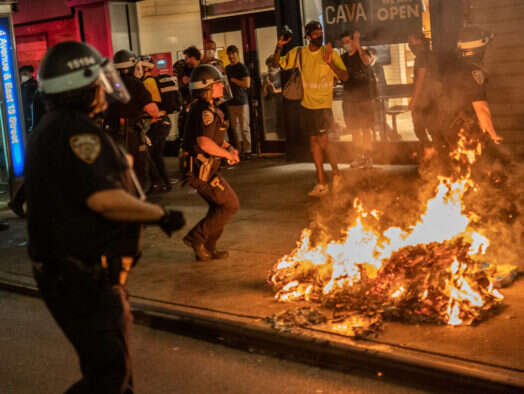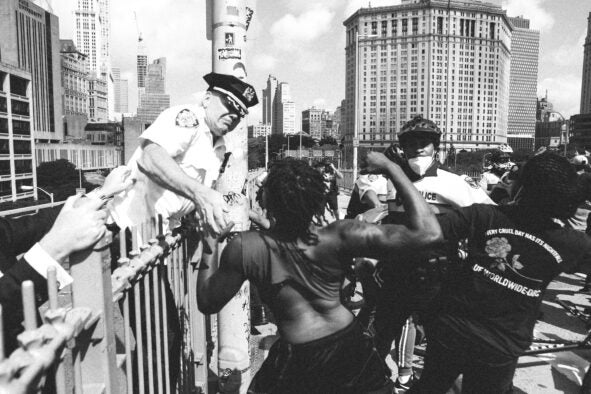
Five photographers who say they were arrested or assaulted during Black Lives Matter protests in New York last year are suing the city’s police force.
The group said officers’ actions against them on five separate occasions last summer demonstrated a “chilling pattern” and they wanted the NYPD to be held accountable for breaching their First Amendment rights.
One of the claimants is British photographer Adam Gray (pictured), who works for news agency SWNS and was named 2020 Press Photographer of the Year by the British Press Photographers’ Association.
He is joined by regular Daily Mail contributor Jae Donnelly, National Geographic photography resident Amr Alfiky, documentary and news photographer Diana Zeyneb Alhindawi, and widely published music photographer Mel D. Cole.
They follow 56-year-old photojournalist Nick Stern who is suing Los Angeles police alleging officers “assaulted, battered and shot” him with rubber bullets as he tried to document Black Lives Matter protests on 30 May last year.
The lawsuit, filed on Thursday, states that each of the five journalists was in the process of “lawfully, peacefully gathering news by photographing police activity from a public street or sidewalk, when he or she was targeted” by NYPD officers.
Four of them were rushed at and struck or shoved to the ground, and three were arrested even as they told officers they were members of the press. None were prosecuted.
The lawsuit said the incidents “exemplify a police culture in which NYPD officers routinely target and retaliate against journalists and members of the public for engaging in constitutionally protected activity – namely, the peaceful recording of police activity taking place in public”.
As well as compensatory and punitive damages, the photographers want an injunction directing New York to end its practice of interfering with, arresting and using physical force against photographers, train officers on the press and public’s right to record police activity in public locations, and discipline officers who violate this constitutional right.
Mickey H. Osterreicher, general counsel of the National Press Photographers Association, which is leading the lawsuit with Davis Wright Tremaine LLP working pro bono, said: “Each of these professional photojournalists was in the process of lawfully, peacefully gathering news by photographing police activity from a public street or sidewalk, when he or she was targeted by one or more NYPD officers.
“This outrageous interference in their constitutionally protected activities is a threat to the most basic freedoms of a democratic society and to the public’s right to know. It must not go unanswered.”
Law Department spokesperson Nick Paolucci told Patch the protests presented an unprecedented challenge for NYPD officers tasked with protecting the rights and safety of New Yorkers, including the media, amid a global pandemic.
“Journalists’ mission to record events at these protests can sometimes present additional challenges for officers,” Paolucci said. “We’ll review these specific claims when we are served.”
The five incidents
The alleged incidents complained of by the five photojournalists are included in court documents, seen by Press Gazette, as follows:
Gray was photographing police rushing and arresting a large crowd of protesters near Union Square while on assignment for The Sun US on 30 May last year, the lawsuit states.
[Read more: ‘Victory’ for British photographer after US protest charges dropped]
He was suddenly pushed to the ground by a police officer, placed in handcuffs and arrested. He repeatedly told officers of his press credentials but was told that, as they were issued by the State Department and not NYPD, they were insufficient.
Gray’s laptop and three cameras were seized and he was taken to a police station where he spent eight hours detained with dozens of other people, many of whom were not wearing face masks.
He was charged with unlawful assembly, but this was later dropped after intervention from influential figures including the British Government, world media commentators, and New York Mayor Bill de Blasio.

People protest in Manhattan, New York, lighting fires and creating barricades, as protests have spread around the country since George Floyd’s death in Minneapolis. 30 May 2020. Picture: Adam Gray / SWNS
Later that night, at about 3am, Alhindawi was covering the looting of a Foot Locker store in lower Manhattan alongside several other press photographers, all of whom complied when police asked them to move back from the window.
The lawsuit states that Alhindawi was staring down her lens when an officer suddenly “charged across the sidewalk to the group of photographers” and hit her in the face with a baton, splitting her lip open.
On 2 June Donnelly, who was on assignment for the Daily Mail, followed a group of protesters who were out past the 8pm curfew, from which he was exempt as a journalist.
At about 9.30pm he was photographing the arrest of a protester when he was struck in the face by a police officer.
According to the lawsuit, he retreated backwards and repeatedly identified himself as a journalist but the officer “nonetheless pursued [him] into the street and shoved him again with such force that [he] landed on the ground several feet away”. The incident was caught on video.
The lawsuit stated he “had not interfered with police activity in any way, had not crossed police lines, and had not been asked or instructed to move prior to being assaulted”.
Donnelly’s camera was seriously damaged in the incident, curtailing his ability to work for weeks afterwards, while he suffered abrasions and large bruises on his arms and legs, head trauma, and a hematoma on his cheek.
Cole was arrested on the morning of 15 July on the footpath of Brooklyn Bridge where he had stood planning to cover a pro-police march before counter-protesters arrived and clashed with officers.

Protesters and police clash on Brooklyn Bridge, New York on 15 July 2020. Picture: Mel D. Cole
After the violence ended Cole was still standing on the footpath when he was approached by two police officers and arrested. He said he was a journalist covering events but was told it did not matter as he did not have a press pass.
The lawsuit points out that he was wearing two professional cameras around his neck and shoulder and that other non-journalists standing nearby were left alone.
Cole was detained for several hours before he was told the NYPD knew he had not been involved in any criminal act and should not have been arrested. However he remained in police custody for several hours after this conversation before being released, the lawsuit said.
The fifth and final photographer, Alfiky, was subject to two incidents listed in the lawsuit. In February 2020 he saw police “chase, tackle, and forcibly arrest” a shirtless man who appeared to be in mental distress. Deeming it a matter of public interest, he began filming with his phone as did several other members of the public.
He was originally six feet away from the arrest but moved backwards by a further 14 feet when asked to do so by police, the lawsuit said.
He then stepped off the pavement in the space between two parked cars to get a better vantage point when an officer “charged across the street… forcibly grabbed him and dragged him back to the other side of the street where the original arrest was still taking place”.
Alfiky offered to get his NYPD-issued press pass out of his backpack but was not allowed and instead was pushed against a car, surrounded by several officers and handcuffed. No other bystanders were arrested.
He was held in a cell for about three and a half hours, during which an officer told him: “Oh, you were trying to be a man, huh? Now look, you’re in a fucking cell.” His press pass was also confiscated and only returned several days later.
Alfiky was also assaulted by police three months later in May 2020 while covering George Floyd protests in Brooklyn which broke into clashes with police.
He photographed with his camera in one hand while holding his press pass at eye level with the other. When he was pushed back along with protesters, Alfiky stated repeatedly: “I’m a journalist, I have a press pass.”
An officer allegedly replied: “I don’t give a fuck about your press pass!”
The officer forcefully shoved him back causing him to trip and fall and injure his back on the pavement kerb. The lawsuit alleges he “continued to violently attack” Alfiky with his baton even as the journalist “lay on the ground in agony, trying to protect his head”, until two protesters helped him up. He subsequently required a surgical procedure on his back.
The lawsuit warned these incidents were not “isolated events”, arguing: “The NYPD has demonstrated a longstanding custom, pattern and practice of unlawfully interfering with the recording of police activity conducted in public view…
“This custom, pattern and practice is the result of a lack of adequate training regarding the First Amendment right of the press and public to record police activities in public, a failure to supervise and discipline officers who retaliate against or interfere with this right, and deliberate indifference by NYPD supervising personnel to a culture of disregard for the constitutional right to record police activity in public.”
Picture: Adam Gray / SWNS
Email pged@pressgazette.co.uk to point out mistakes, provide story tips or send in a letter for publication on our "Letters Page" blog
